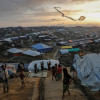US to step up pressure on Myanmar army
In the face of widespread "atrocities" against ethnic Rohingya people in Myanmar, the United States has been cautiously stepping up pressure on Myanmar's army, while taking care to avoid endangering the civilian government of Aung San Suu Kyi.
As the US takes a more active role in the region — several American delegations have passed through in recent weeks — Secretary of State Rex Tillerson plans to travel to Myanmar tomorrow to meet Suu Kyi, the nation's leader, as well as army chief General Min Aung Hlaingm, reports AFP.
Tillerson is expected to adopt a firm tone with military leaders in Myanmar, whom he has deemed "responsible" for the crisis facing the Rohingyas, an embattled Muslim minority that has seen more than 6,00,000 of its members flee to neighbouring Bangladesh in two and a half months.
In the name of putting down a supposed Rohingya rebellion, the army has since Aug 25 waged a sweeping military campaign in the western state of Rakhine, burning villages and sending thousands into what has become the largest exodus in the world today.
The UN has denounced the campaign, including allegations of killings and mass rape, as "ethnic cleansing".
Recently returning from Myanmar and the overflowing refugee camps in Bangladesh, Simon Henshaw, the State Department official responsible for refugee and migration issues, said the scene in the camps was "shocking."
"The world can't just stand by and be witness to the atrocities that are being reported in that area," Tillerson said in October.
But it is unclear what steps the United States might take. Up till now, the State Department has merely strengthened a few punitive measures aimed at Myanmar's army.
In the absence of more determined action from the White House or State Department, several members of the US Congress are calling for sanctions to limit military cooperation with Myanmar and ban its army members from US soil. A draft bill would also ban the importation of rubies or jade from the country.
ASEAN SUMMIT SKIPS OVER ROHINGYA CRISIS
According to Reuters, a draft of the statement to be issued after a Southeast Asian summit makes no mention of the exodus of Rohingya Muslims from Myanmar's Rakhine state following a military crackdown that has been described by the United Nations as ethnic cleansing.
One paragraph of the communique, seen by Reuters yesterday, mentions the importance of humanitarian relief provided for victims of natural disasters in Vietnam and a recent urban battle with Islamist militants in the Philippines, as well as "affected communities" in northern Rakhine state.
In the ASEAN summit in Manila yesterday, it was unclear whether the crisis was on ASEAN's official agenda, although two countries -- Malaysia and Indonesia -- did bring it up in talks on the meeting's sidelines, according to a report of CBS news yesterday.
Harry Roque, spokesman for the summit's host, quoted Philippine leader Rodrigo Duterte, as saying, "the Rohingya people's plight was discussed in the plenary. It was specifically brought up by two member states, and Myanmar specifically addressed the Rohingya issue."
According to Roque, the delegation from Myanmar said Suu Kyi's government was "in the process of attending to" a report compiled by former UN chief Kofi Annan, laying out a series of steps to end the violence and repatriate the Rohingyas.
Roque said the officials from Myanmar had assured their neighbours that "the process of repatriation for displaced people will conclude three weeks after signing of a memorandum agreement, we're understanding, with Bangladesh."
"ASEAN summits are not designed to actually construct policy responses to major human rights issues that affect the whole region," said David Mathieson, a former human rights researcher who is now an independent analyst based in Myanmar. "Right now, Suu Kyi's government is benefiting from ASEAN's culture of inaction."
When the UN Security Council last week called for Myanmar to "end the excessive military force and inter-communal violence that had devastated the Rohingya community," Suu Kyi's office responded that it regretted the council's statement.
WE CANNOT BE BYSTANDERS
"We must not be bystanders to this genocide. We cannot allow people to be slaughtered and burnt out of their homes, while the world watches," wrote Salman Rushdie and dozens of others in an open letter last Friday.
After every atrocity, we say: "Never again. We must mean it," the letter, which was published by UK's The Guardian, said.
The writers said Bangladesh has opened its borders and is doing what it can, which is a lot for the most densely populated country on earth, already fighting poverty and the consequences of climate change.
"The international response to the Rohingya crisis has fallen far short of what's needed. The UN appeal is still underfunded, and world leaders have not put sufficient political pressure on the government," reads the letter.
The corporations who have invested in this region must speak up and divest, unless human rights are respected, or they too will be complicit in these horrendous acts, the letter said.
WFP CONCERNED ABOUT HIGH MALNUTRITION AMONG ROHINGYA
The United Nations World Food Programme (WFP) is redoubling its efforts to address malnutrition among refugees in Cox's Bazar but warns that a broader effort is needed because clean water, toilets and health facilities are as vital as food in tackling malnutrition.
A new survey shows that the malnutrition rates in Kutupalong refugee camp are alarming. The preliminary findings indicate that one in four Rohingya children are suffering from malnutrition; a higher rate than anticipated. The survey was conducted by UNICEF, Action Contre la Faim, Save the Children, UNHCR and WFP, said a press release yesterday.
Other assessments taking place in November will provide a clearer picture of the nutrition situation for the new arrivals.
The findings will update the projected number of children expected to suffer severe acute malnutrition over the next few months, and guide the wider emergency response.

 For all latest news, follow The Daily Star's Google News channel.
For all latest news, follow The Daily Star's Google News channel. 








Comments